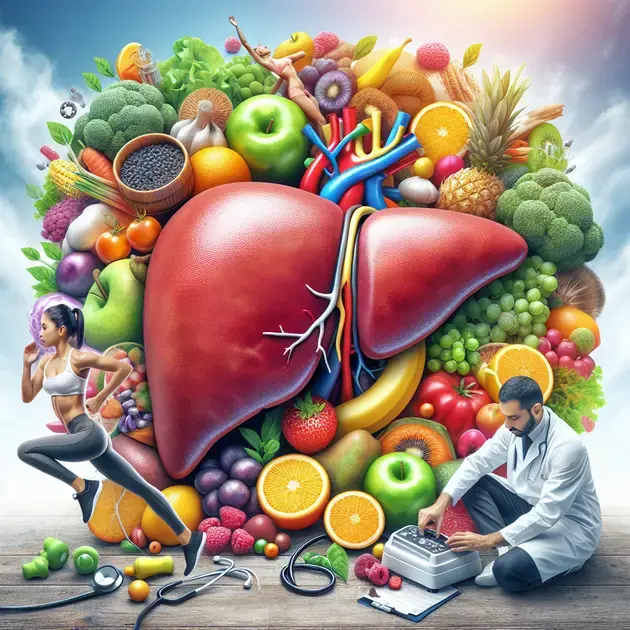The liver is a vital organ that plays a crucial role in the body’s ability to function properly. Understanding the liver and what it does is essential for maintaining overall health and well-being. From filtering blood to metabolizing nutrients, the liver is involved in a wide range of important functions that impact everything from digestion to detoxification.
Recent studies have shown that the liver also plays a key role in regulating cholesterol levels and hormone production. This complex organ is constantly working behind the scenes to keep the body in balance, making it important to have a basic understanding of how it functions. By learning more about the liver and its functions, we can make informed decisions about our health and well-being.
The Significance of the Liver in Our Body Function
The liver plays a crucial role in the overall function of our bodies. It is the largest internal organ and is responsible for numerous vital functions that are essential for our health. From detoxification to digestion, the liver is involved in various processes that keep our bodies functioning properly.
Key Functions of the Liver:
1. Detoxification: The liver helps in removing toxins from the body, making sure that harmful substances are eliminated efficiently. To support the liver in its detoxification process, consider including foods rich in antioxidants like berries and leafy greens in your diet.
2. Metabolism: The liver plays a key role in metabolizing nutrients from the food we eat, converting them into energy or storing them for later use. To support healthy liver metabolism, you can try incorporating liver-supportive herbs like milk thistle into your daily routine.
3. Synthesis of Proteins: The liver is responsible for producing important proteins essential for various bodily functions, such as blood clotting and immune system support. Consuming an adequate amount of protein in your diet can help support this function of the liver.
4. Storage of Vitamins and Minerals: The liver acts as a storage unit for essential vitamins and minerals like vitamin A, D, and iron. Ensuring a balanced diet rich in these nutrients can help maintain optimal liver health and function.
5. Regulation of Blood Sugar Levels: The liver helps in regulating glucose levels in the blood by storing excess glucose as glycogen or releasing it when the body needs energy. Maintaining a stable blood sugar level through a balanced diet and regular exercise is crucial for liver health.
The Liver’s Role in Maintaining Overall Health
Optimal liver function is essential for maintaining overall health and well-being. By understanding the key roles of the liver and taking steps to support its function, you can promote better health outcomes and improve your quality of life.
Steps to Support Liver Health:
1. Stay Hydrated: Drinking an adequate amount of water is essential for liver health as it helps to flush out toxins and support overall detoxification processes. Aim to drink at least 8-10 glasses of water per day to keep your liver functioning optimally.
2. Eat a Balanced Diet: Consuming a diet rich in fruits, vegetables, whole grains, and lean proteins can provide essential nutrients that support liver function. Avoiding processed foods and excessive alcohol consumption can also help maintain a healthy liver.
3. Exercise Regularly: Physical activity not only helps in maintaining a healthy weight but also supports liver function by promoting blood flow and reducing the risk of fatty liver disease. Include both cardio and strength training exercises in your routine for optimal liver health.
4. Get Regular Check-ups: Schedule regular health check-ups with your healthcare provider to monitor your liver function and address any potential issues early on. Blood tests and imaging studies can help assess the health of your liver and guide treatment if needed.
5. Avoid Harmful Substances: To protect your liver, avoid smoking, limit alcohol consumption, and be cautious when taking medications that may have hepatotoxic effects. By reducing your exposure to harmful substances, you can help preserve your liver health in the long term.
**
The Importance of Liver Health
**
Your liver is a vital organ responsible for various essential functions in the body, such as metabolizing nutrients, filtering toxins from the blood, and producing bile to aid in digestion. Maintaining liver health is crucial for overall well-being and longevity. Poor liver health can lead to serious health issues, including liver disease, fatty liver, and even liver failure. By taking care of your liver, you can prevent these conditions and ensure your body functions optimally.
One of the key ways to promote liver health is through a balanced diet. Consuming a variety of fruits, vegetables, whole grains, and lean proteins can help support liver function and prevent the accumulation of harmful substances. In addition, staying hydrated and limiting alcohol consumption are important factors in maintaining a healthy liver.
Regular exercise is also beneficial for liver health. Physical activity helps reduce fat buildup in the liver and promotes overall metabolic health. Aim for at least 30 minutes of moderate exercise most days of the week to keep your liver in top condition.
Another crucial aspect of liver health is managing underlying health conditions, such as diabetes and obesity, which can increase the risk of liver damage. By controlling these conditions through proper medical care and lifestyle modifications, you can protect your liver from harm and promote overall well-being.
In conclusion, prioritizing liver health is essential for maintaining a healthy body and preventing serious health issues. By adopting a balanced diet, staying active, and managing underlying health conditions, you can support optimal liver function and enjoy a long and healthy life.
**
Common Liver Disorders to Watch Out For
**
There are several common liver disorders that individuals should be aware of to ensure early detection and proper management. One of the most prevalent liver disorders is fatty liver disease, which can be caused by factors such as obesity, high cholesterol, and excessive alcohol consumption. Fatty liver can progress to more severe conditions, such as cirrhosis, if left untreated.
Hepatitis is another widespread liver disorder, with hepatitis A, B, and C being the most common types. These viruses can cause inflammation and damage to the liver, leading to long-term complications if not diagnosed and treated promptly. It is important to practice safe hygiene and get vaccinated against hepatitis to prevent infection.
Cirrhosis is a late stage of scarring of the liver caused by various liver diseases and conditions, such as hepatitis and chronic alcohol abuse. Cirrhosis can result in liver failure if not managed effectively through lifestyle changes, medication, and sometimes liver transplantation.
Primary liver cancer, also known as hepatocellular carcinoma, is another serious liver disorder that can arise from chronic liver disease or infection with hepatitis B or C. Early detection and treatment are crucial for improving outcomes in individuals with liver cancer.
By understanding the common liver disorders and their risk factors, individuals can take proactive steps to maintain liver health, such as regular screenings, lifestyle modifications, and vaccination against hepatitis. Early intervention is key to preventing complications and promoting overall liver well-being.
**
Nutrition Tips for a Healthy Liver
**
A nourishing diet plays a crucial role in supporting liver health and preventing liver disorders. Incorporating nutrient-rich foods into your meals can help optimize liver function and reduce the risk of liver damage. Include plenty of fruits and vegetables in your diet, as they are rich in antioxidants and fiber, which help cleanse the liver and aid in digestion.
Healthy fats, such as those found in avocados, nuts, and fatty fish, also benefit liver health by reducing inflammation and promoting healthy cholesterol levels. Avoiding saturated and trans fats is important, as they can contribute to fatty liver disease and other liver disorders.
Limiting sugar and refined carbohydrates is important for maintaining a healthy liver, as excess sugar consumption can lead to fatty liver and insulin resistance. Opt for whole grains and natural sweeteners like honey or maple syrup instead of processed sugars.
Hydration is key for liver health, as water helps flush out toxins and waste products from the body. Aim to drink plenty of water throughout the day to support liver function and overall well-being.
Incorporating herbs and spices like turmeric, ginger, and dandelion root into your diet can also benefit liver health, as they have anti-inflammatory and detoxifying properties. Consider adding these ingredients to your meals or enjoying them in teas or supplements for extra liver support.
Conclusion
The liver is a critical organ responsible for numerous essential functions in the body, including nutrient metabolism, toxin filtration, and bile production. Maintaining optimal liver health is paramount for overall well-being and longevity. Neglecting liver health can result in severe conditions like liver disease, fatty liver, and even organ failure. By prioritizing liver care through a balanced diet rich in fruits, vegetables, whole grains, and lean proteins, individuals can support liver function and prevent the accumulation of harmful substances.
Regular exercise is also key to promoting liver health, as physical activity aids in reducing fat buildup in the liver and enhancing metabolic well-being. Engaging in moderate exercise for at least 30 minutes most days of the week can significantly benefit liver health. Managing underlying health issues such as diabetes and obesity is crucial in preventing liver damage. Through proper medical care and lifestyle adjustments, individuals can safeguard their livers and enhance overall health.
In conclusion, safeguarding liver health is imperative for fostering a healthy body and averting serious health complications. By embracing a well-rounded diet, staying physically active, and addressing underlying health conditions, individuals can bolster liver function and embrace a lengthy and thriving life. Understanding common liver disorders, such as fatty liver disease, hepatitis, cirrhosis, and liver cancer, empowers individuals to take proactive measures like regular screenings, lifestyle modifications, and hepatitis vaccinations to preserve liver health. Early detection and intervention are pivotal in fostering liver well-being and preventing adverse outcomes.

